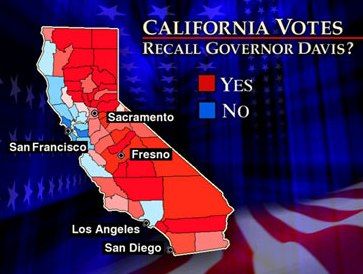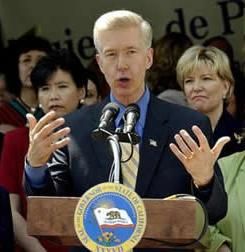Why was 2003 recall so unique? Joe Mathews misses key point
by Chris Reed | October 5, 2013 6:15 am
 Joe Mathews has written an interesting column[1] about the 10th anniversary of the recall of Gov. Gray Davis.
Joe Mathews has written an interesting column[1] about the 10th anniversary of the recall of Gov. Gray Davis.
assignment online[2]
“Critics of the recall said it was a crazy idea, a partisan Republican power grab, a perversion of America’s tradition of representative government. Supporters said it was the epitome of popular revolt and the first step toward the remaking of California. Love it or hate it, everyone agreed — the recall was titanic in impact.
“No one thinks that today. Ten years later, the recall rarely comes up in political conversation. One of its strongest supporters, the California Republican Party, will hold no commemorations of it at a party convention this weekend. …
“So what happened to the recall? Politicians and pundits who once hyped it will now tell you that it was overhyped. They’ll point out that California has very few people or interest groups who understand how our complicated state government works, and even an election as spectacular as the recall election of 2003 couldn’t change that. …
“But in less obvious ways the influence of the recall persists. It helped spawn a political reform movement that, for all its failures, remains a credible force. … Some of Governor Schwarzenegger’s more progressive policies on non-budgetary items like climate change are likely to endure. The man who provided the funds to get the recall on the ballot, Darrell Issa, heads a crucial House of Representatives committee and may be the most important Californian in Congress. And the recall gave a big boost to the fame of Arianna Huffington, who would use that notoriety to launch The Huffington Post in 2005. (I’d argue that she—not Schwarzenegger, who was sentenced to govern this ungovernable state—was the real winner of the recall.)”
Unmentioned: The singularly unpopular Gray Davis
 Joe makes many sharp points. But I think he leaves out a key factor that made the recall unique and likely to succeed: Gray Davis' epic unpopularity with just about everybody. He may have been re-elected in 2002, but it was because he picked his opponent. Davis' intervention in the Republican primary got the weak Bill Simon the nomination over the much-more-formidable Richard Riordan. (Davis spent at least $7.5 million in attack ads[3] trashing Riordan for being a social liberal, anathema for GOP primary voters.)
Joe makes many sharp points. But I think he leaves out a key factor that made the recall unique and likely to succeed: Gray Davis' epic unpopularity with just about everybody. He may have been re-elected in 2002, but it was because he picked his opponent. Davis' intervention in the Republican primary got the weak Bill Simon the nomination over the much-more-formidable Richard Riordan. (Davis spent at least $7.5 million in attack ads[3] trashing Riordan for being a social liberal, anathema for GOP primary voters.)
It wasn't just Republicans who were upset with his car-tax hike, his budget dithering and the sleaziness of his pay-to-play fundraising. Then-Attorney General Bill Lockyer, a fellow Dem, famously ripped Davis in summer 2003 for his “puke politics.”[4] The president of the California Teachers Association revealed that in the governor's office on Valentine's Day 2002, Davis had demanded a $1 million donation[5]. The bad blood between the CTA and the Democratic governor was real and intense[6].
The CTA ended up fighting the recall. But it was going through the motions. And Lockyer joined a lot of Californians in voting for the recall and for a fresh face, at least if you look past Arnold's facelifts and fake tan.
This factor goes a long way toward explaining why the 2003 recall happened. Gray Davis was a unifying figure — unifying state voters in a desire to get him out of power.
- interesting column: http://www.foxandhoundsdaily.com/2013/10/recall-recall/?utm_source=rss&utm_medium=rss&utm_campaign=recall-recall
- assignment online: http://domyassignmentonline.com/
- $7.5 million in attack ads: http://articles.latimes.com/2002/feb/22/local/me-money22
- “puke politics.”: http://www.sacbee.com/static/weblogs/insider/archives/000317.html
- $1 million donation: http://spectator.org/archives/2002/05/13/governor-shakedown
- real and intense: http://spectator.org/archives/2002/05/13/governor-shakedown
Source URL: https://calwatchdog.com/2013/10/05/50854/